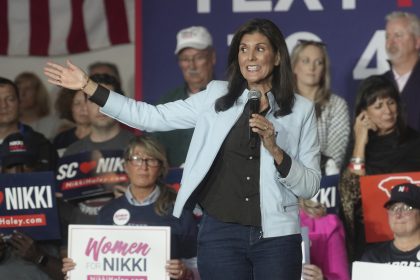With Shift In Focus, Has End Citizens United Become Just Another Money Machine?

WASHINGTON – It was a typical day at the Iowa State Fair, just outside of Des Moines.
The smell of just about anything you can imagine fried and served on a stick permeated the air, livestock mostly slumbered through being judged, and this being the summer before an Iowa Caucus, a large crowd assembled near the Des Moines Register Political Soapbox, the small stage fringed with hay where presidential candidates compete with the sounds of carnival rides for 20 minutes of good-natured retail politicking.
Amid all the activity, and not far from where a local beauty contest was transpiring, Tiffany Muller, president of End Citizens United, was telling a reporter about the organization and its goals.
“We’ve called on the entire presidential field to make comprehensive anti-corruption reform legislation the very first bill they do in a new administration,” Muller told Elizabeth Meyer of Iowa Starting Line, a news organization that focuses exclusively on Iowa politics.
ECU calls White House hopefuls who heed the call “Reform First” candidates, and there are at least four still in the race – Sen. Elizabeth Warren, D-Mass., South Bend, Ind. Mayor Peter Buttigieg, former Texas Rep. Beto O’Rourke, and Sen. Amy Klobuchar. D-Minn.
“They’re talking about it because they know how much it resonates with voters and they’re seeing the connection with everything else we’re talking about,” Muller told Meyer.
“I don’t think a year ago we would have expected that all folks who are running for president would not be taking any corporate PAC money,” she said later in the interview. “Almost all of them are not taking lobbyist money. All of them have prioritized this issue in one way or another. Almost the entire field has sworn off single-candidate super PACs, and that’s huge.”
How can a PAC work to eradicate PAC contributions?
But the exchange raised as many questions as it answered – for starters, how can a PAC work to eradicate PAC contributions? When it was founded in 2015, End Citizens United’s name was literally its mission.
In early versions of its website, now memorialized at archive.org, ECU was a full-throated response to the U.S. Supreme Court’s 2010 decision in Citizens United v. FEC, the case that established the legal basis for the idea that “corporations are people” when it comes to political contributions.
On its website, ECU decried the decision as “one of the worst judicial rulings” in American history, one that “opened the door for right-wing special interests to spend unlimited money in our elections.”
It’s solution was calling for a Constitutional Amendment to overturn the high court’s ruling. It even had one to promote — a 2013 proposal introduced by Sen. Tom Udall, D-N.M.
But over time, End Citizens United’s focus has appeared to wander from its original purpose.
While there are similarities in the language it uses on its website today, compared to what it said in the organization’s earliest days, the nuances have changed.
Where Citizens United was once described as the worst Supreme Court decision in American history, now it is described as something that “has completely changed the landscape of American elections.”
The ruling the website now says, “opened the door for billionaires and special interests” to “spend unlimited untraceable money” in U.S. elections.
“Now, there’s no accountability at all,” the website says.
The bad guys now are “billionaires like the Koch Brothers and corporations” who are “trying to tip the balance of political power in their favor.”
By the midterms, End Citizens United was acting like any other PAC, targeting incumbents it didn’t like. It called out what it described as the “Big Money 20,” members of Congress who it claimed were especially beholden to the big money donations from energy companies and the pharmaceutical industry.”
“These are the worst of the worst in Congress,” Muller told USA Today.
At the State Fair she told Meyer “We helped flip the House in 2018,” adding “it was our No. 1 priority.”
Heading into the 2020 primaries critics of ECU change of tack eye the organization warily, particularly when it comes to its blanket attacks on corporate money and particularly, corporate PACs.
Though PACs in one form or another have been around since the early 1940s, they were a key element of the Bipartisan Campaign Reform Act of 2002 (also known as the McCain-Feingold Act). They are regulated by and subject to reporting rules established by the Federal Election Commission.
Despite this, PACs are easy targets to attack, a Democratic fundraiser said. The public is largely uninformed about how they work, “and PACs aren’t exactly out there defending themselves.”
“Personally, I think that as people began to demonize PACs, ECU and Mothership began to gravitate in that direction because that’s what’s where the money is today,” she said.
The Well News made several attempts to reach out to ECU about this and other issues related to its history and campaign finance reform. It received no response.
ECU is effectively creating a fire to raise money to put out a fire that wouldn’t exist if not created by ECU.
Among the questions forwarded to ECU was why it organized as a PAC, and were there advantages to doing so as opposed to being some other kind of nonprofit; and whether, as some critics have suggested, ECU is effectively creating a fire to raise money to put out a fire that wouldn’t exist if not created by ECU.
“The thing that gets my blood boiling is that they’ve painted corporate PACs in a negative light when what they really represent are individual employees willingly giving $20, $40 or at most $75, and aggregating under the name of their company to make a bigger splash,” she said.
“John Smith from Iowa isn’t going to be much more than a blip donating $20 to a Senate race in California. But if he gets his company’s PAC to support his candidate in that race, his voice is going to be that much louder,” she continued. “That’s what is so frustrating to all of us in the fundraising world. ”
A TIME OF CHANGE
When it comes to campaign finance, the 2000s have been a time of enormous change. Technology and the advent of social media have made it easier than ever before to connect with voters and solicit contributions.
Then there is the matter of Citizens United v. Federal Election Commission, the 2010 U.S. Supreme Court decision that shocked the system perhaps as no other campaign finance ruling ever has.
Writing for the majority of a bitterly divided court, Justice Anthony Kennedy held that political spending is a form of protected speech under the First Amendment, and that the government may not keep corporations or unions from spending money to support or denounce individual candidates in elections.
While corporations or unions may not give money directly to campaigns, Kennedy wrote, they may seek to persuade voters through other means, including ads, especially where these ads were not broadcast.
Both Mothership Strategies, the phenomenally successful digital advertising and fundraising agency, and End Citizens United, a PAC founded on the premise of reversing the high court’s ruling by constitutional amendment, are products of these times.
Depending on your point of view, what follows is either a story of extraordinary entrepreneurial success or the tale of a pair of intertwined organizations that for some are the equivalent of fingernails raked across a chalkboard.
HUMBLE START, DECISIVE RISE
As the internet, email and social media advertising have made small-dollar fundraising more practical and lucrative, a number of former D.C. staffers are using their campaign-honed expertise to build consultancies around these services.
Of these, Mothership Strategies has arguably enjoyed the most success – and inspired the most controversy. It appeared virtually out of nowhere in late 2014 and four years later was able to rake in tens of millions of dollars from the small donations that gravitated to Democratic candidates during the 2018 midterm elections.
The firm was started by Greg Berlin, the former digital campaign director for the Democratic Congressional Campaign Committee; Charles Starnes, a former deputy digital director at the DCCC; and Jake Lipsett, an ex-congressional staffer.
But the story of how they came to found their company is murky — in part because the founders generally refrain from doing on-the-record interviews.
According to one longtime Democratic strategist, speaking to the Well News on background, the first time she heard of an entity called the Mothership was sometime in mid-2014.
She had just begun working for a client on the Hill when she was told the client was getting digital marketing services from a new consultancy founded by three former staffers at the Democratic Congressional Campaign Committee.
By November 2014, Mothership Strategies had a GoDaddy website and was open for business.
But, as reported by the Huffington Post, the three founders still felt stymied, believing the big money pouring into politics in the wake of Citizens United was thwarting their efforts to advance the Democratic Party line.
They responded in March 2015 by founding a PAC, End Citizens United (ECU), which built a platform for pro-campaign finance reform candidates to spread their message and solicit grassroots funding from a national audience.
The only requirement ECU placed on candidates initially is that they promise to support a constitutional amendment overturning the Citizens United decision once in office.
For a time, both Mothership Strategies and End Citizens United shared a single room office space above a La Colombe Coffee Roasters shop several blocks north of the White House.
Those humble days were not to last.
Fueled by the outrage inspired by the Supreme Court, End Citizens United quickly grew in power and influence. Because it also happened to be Mothership Strategies’ biggest client, the profile of the digital campaign services firm rose as well.
The era of bad feelings was not far behind
BAD FEELINGS
From a financial perspective, forming ECU on March 1, 2015, and having it as a client was a windfall for Mothership Strategies.
In less than 10 months in 2015, Mothership Strategies raised nearly $5.2 million on behalf of End Citizens United, nearly all of it from small donations averaging about $13.87. At the same time Mothership Strategies grew ECU’s campaign list to more than 2 million supporters.
“The money raised and people mobilized by Mothership Strategies has made ECU one of the most powerful voices in Democratic politics in 2016,” Mothership declared in a case study on its website.
The other case study on Mothership Strategies’ website in April 2016 was for Save Animals Facing Extinction, a coalition of philanthropists and leading conservation and zoological organizations formed to pass a ballot measure to prohibit the purchase, sale and distribution of products made from endangered animals.
The coalition hired Mothership Strategies just 100 days before Election Day.
In that time, it said, SAFE was able to recoup its initial investment of $60,000, raise $360,000 and grow its list of supporters to 285,000 names.
And the ballot measure passed.
However the question for any fledgling company is how to use one’s limited manpower effectively while staffing ramps up to match one’s growth.
Mothership Strategies responded by dramatically increasing its fees. Some critics have since noted the firm charges some clients a commission of 15 percent on funds raised online — much higher than the industry standard of 7 to 10 percent.
The chatter at the time was that once it had ECU as a client and was proving attractive to other reform-oriented groups, working with the frontline members who had followed the Mothership founders from the DCCC proved less attractive.
“Working with institutions and associations was simply better for the bottom line,” said a Capitol Hill staffer who spoke on background about the fee hike.
The frontline members were livid.
“I heard some of them say, ‘We’ll show them … we’re planning a mass exodus from Mothership,’ the Democratic strategist said. “And all you could say, if you were being honest, was ‘the reason they’re charging you these ridiculous fees in the first place … is they want to get rid of you guys.'”
“And who can blame them,” the strategist said. “I get it from a business perspective. They were making a lot more money with these bigger clients. Those clients brought in a whole lot more, given their business model.”
Soon, in addition to its work for End Citizens United, Mothership Strategies was providing its services to some of the most influential caucuses, PACs and campaigns in the country.
So profitable was the business that by the time its attention was squarely focused on the 2018 midterms, Mothership Strategies had nearly 100 people on staff.
This is where things begin to get wonky. Evidently sensitive to appearances, neither Mothership Strategies nor End Citizens United mentioned their obvious connection on their respective websites.
And the two firms continue to downplay any appearance of a common lineage to this day.
Officially — meaning verifiably, via Federal Election Commission records — Mothership Strategies is ECU’s online fundraising consultant.
“We work with them to raise money for ECU and for candidates we have endorsed,” said an End Citizen United employee, speaking on background. “ECU and Mothership are two completely separate entities.”
Defenders of both entities say Mothership Strategies’ rise to being one of the highest-paid vendors in the industry simply illustrates how lucrative the small-dollar donation era can be for political consultants who also come armed with enough business savvy to make the election gamble pay off.
But the firm’s success — and the massive influx of cash it gets from End Citizens United — has inspired raised eyebrows in some Democratic circles.
AGGRESSIVE, HIGH-VOLUME SOLICITATION
No one will ever accuse Mothership Strategies of being afraid to use all CAPS in an email subject line.
From the start, Mothership Strategies employed an aggressive, high-volume solicitation strategy on behalf of ECU and its other clients.
To recipients, the emails, sometimes as many as seven per day, were a deluge of doom and gloom. Each message was in some way marked “urgent” and the hair-on-fire text often verged on the apocalyptic.
Potential donors were asked to “rush” their donations to ECU and prevent Republicans from further dismantling campaign finance laws.
Within a year of its founding, ECU had raised $11 million, mostly from small donations, and most of them collected online, the Huffington Post reported.
In an interview with the Post’s Paul Blumenthal , Greg Berlin described the initial outpouring of support as “proof of concept.”
“In some ways what Mothership Strategies has done isn’t all that different from what others have done; they’ve just taken it to a higher level,” the Democratic strategist quoted earlier said.
That’s a position shared by members of the nonprofit community who rented their donor lists to Mothership Strategies only to later be overcome with seller’s remorse.
After donations, the renting or selling of donor lists is a time-honored way for nonprofits to raise cash; but the value of such of a list is determined by how it can be used. Place too many restrictions on buyers, and pretty soon no one wants your list.
By their nature, nonprofits prefer consistent engagement to the hard-sell; building long-term relationships to the emailed battering ram.
They also hoped to raise money to meet their own needs from the same pool of donors that Mothership Strategies and ECU were now tapping.
The word around town was that donors were becoming confused and angry, believing they’d already given to a favorite nonprofit, only to learn they’d given to End Citizens United instead.
Other donors complained that once you got in End Citizen United’s crosshairs, you couldn’t simply “unsubscribe” to get out of them.
All the while, the men behind Mothership Strategies and End Citizens United kept their heads down, content to focus on their clients rather than any controversy that might be brewing.
THE QUESTION OF COMMITMENT
The situation came to a head in May 2015. Several members of the nonprofit community asked an ally, Scott Swenson, then of Rethink Media, to broker a meeting with End Citizens United.
Greg Berlin was in attendance. So too was Valerie Martin, lead consultant for End Citizens United PAC and representatives of at least 20 other groups working on campaign finance reform.
Swenson, now communications director at Common Cause, later described the meeting to the Huffington Post as “heated.”
To be fair, a complete meeting of the minds was never going to happen. The two sides were as different as two teams in “shirts” and “skins” in a sandlot soccer game.
Most of those in the room represented small nonprofits, the kinds of organizations that scrimp to stay as lean as possible so the highest percentage possible of their donations go to the cause or issue they are seeking to address.
Together, Mothership Strategies and ECU had the ability to raise an amount equal to most of the nonprofits’ annual budgets in a matter of days.
The other distinction between the two sides was that where many of the nonprofits spent considerable time marshalling legislation through the halls of Congress and doing the grunt work necessary to get a ballot initiative off the ground.
What ECU was doing with the scads of money Mothership Strategies raised for it, no one knew exactly, but what they did know was ECU sometimes appeared to take credit for the work done by others.
“They never said explicitly ‘We at End Citizens did this’ … but there were times when some legislative initiative or other work on campaign finance being done around the country came to fruition and they’d post something or send out something saying ‘We won,'” said one attendee of that initial meeting.
“It was definitely a murky and gray area, and it wasn’t always clear that what they meant was ‘We the people won,'” he said.
And along with never referencing its founders on its website, ECU didn’t clearly tell web visitors it was a PAC.
“Transparency was the big issue people had,” the meeting attendee said. “The complete lack of transparency about how much the partners were being paid and how the profit was being handled at Mothership … and there was very strong feeling in the room that they were trying to sound like an NGO or a nonprofit, while raising money for a PAC using very aggressive, political committee strategies.”
ECU and the Mothership’s approach definitely rankled.
Although the public often perceives nonprofits working on “good government” causes as being to the left of the political spectrum, the reality is most strive to be nonpartisan, believing that both parties need to be at the table if any sort of meaningful political reform is going to be achieved.
“The thing about ECU and Mothership is that they were always going to be Democrats, of Democrats, by Democrats and for Democrats,” the meeting attendee said. “Their presence in the campaign finance reform space immediately politicized it, and I think the fear was that democracy was now just going to become the new abortion or the new death penalty or the new tax fight … just another place for people to be red and blue.”
There was also a question of commitment. Where some nonprofits had spent years trying to get campaign finance reforms adopted on the state level, and then spent years making sure those reforms were implemented as promised, End Citizens United simply didn’t have that track record.
For some, the resentment they felt was fueled by the feeling that End Citizens United and Mothership Strategies were “sitting in their cozy little offices in D.C.” and “blasting out information about things happening in the states when they had no one on the ground to collect the information first hand.”
Then, there was the matter of the donors.
Some of the nonprofits believed their donors were simply getting worn out from the ECU/Mothership email barrage.
Others feared worse: that the solicitations were sowing confusion in the nonprofit donor space, confusion that might inspire donors to pull back.
“We expressed concerns to them about the way they were raising money,” Swenson told the Huffington Post.
“They were very vague,” he said.
The Mothership and ECU saw nothing to gain in being transparent and revealing anything about what they’d done or were planning to do with all the money they’d raised. They had no incentive to open their kimono to anyone.
Later, Berlin told the Huffington Post he and Martin simply didn’t want to commit to anything “in case we decide to change plans.”
But it would be wrong to say the meeting bore no fruit. End Citizens United took a week-long break from fundraising and it promised to better identify itself as a political action committee in communications with donors.
Two smaller meetings were held between the two sides, but nothing tangible came from them, attendees said.
The Well News reached out to Mothership Strategies and End Citizens United, but on the record interviews were not forthcoming.
DONORS RESPOND TO FERVENT APPEALS
What’s clear is that Mothership Strategies’ stock and trade – fervent email appeals, have paid dividends to both itself and the candidates it has represented.
Its first high-profile race was the June 2017 special election to represent Georgia’s 6th Congressional District, outside of Atlanta.
Over the course of the race, Mothership Strategies reportedly raised $31.6 million for Democrat Jon Ossoff, more than 60 percent of it in donations of less than $200.
Though Ossoff would eventually lose to Republican Karen Handel by some 10,000 votes , the campaign was the most expensive House race in history, and Mothership Strategies was elevated to the stratosphere.
By the following year, the business model was in place.
According to The Washington Post, about a quarter of the payments Mothership Strategies received during the midterm elections came not from campaigns, but from political entities.
The three groups — End Citizens United, Progressive Turnout Project and National Democratic Training Committee — together paid more than $9 million to Mothership, the Post said, citing election filings.
Patrick Burgwinkle, communications director for End Citizens United, would not speak on the record about the PAC’s relationship with Mothership Strategies.
“End Citizens United is dedicated to countering the disastrous effects of Citizens United and reforming our campaign finance system and to end Big Money in politics and fix our rigged political system. We work to elect campaign finance reform champions,” he said.
“The focus on small dollar donors is a positive development for our democracy and the Democratic Party because it is increasing the number of people who are participating in our elections and reducing the influence of big money in our politics,” he said.
The truth is, there are no rules governing the relationship between the two firms.
“Federal coordination laws currently only require ‘firewalls’ when the same firm or organization is doing work for a candidate or party and an outside group on the same specific election, like a particular House race,” explained Adam Lioz.
To this day, people are trying to figure Mothership Strategies and End Citizens United out — not a bad thing if you’re an entity trying to keep the competition on its back foot, but frustrating if you’re anybody else.
Not too long ago, a conversation with a Democratic fundraiser revealed some of the old frustrations with Mothership and ECU still linger.
The fundraiser said, “ECU doesn’t really embrace the irony of using money to get rid of money in politics, and Mothership, of course, is a for-profit entity.”























